The Review Board on Principles of Shared Data Creation and Stewardship has released their final report on OCLC’s proposed policy for use of records (pdf), and after reviewing the report, OCLC has formally withdrawn the policy.
This conclusion to the records policy proposal is the best that could be imagined. OCLC has listened to criticism from the greater library community, considered both the policy and it’s criticism through the efforts of the Review Board, and has responded in a way that allows everyone to move forward with a greater understanding of how best to go about updating the policy.
I suggested early on that OCLC was a tiger, instinctively defending its territory. This still feels like a proper metaphor: the movement towards creating a policy without proper input from the library community, and the subsequent review and withdrawing of the policy, seems more like an organization that didn’t realize the true implications of what it was putting in place, as opposed to one that was attempting a power grab to create a monopoly.
This was, and remains, a critical issue for libraries. The ability to use the metadata representing our collections (as well as connecting them to collections and resources beyond what we own) is critical to our future ability to offer services in ways that will serve our patrons best.
I certainly hope that OCLC sets up a policy creation board similar to the review board – one that seeks a wide a range of ideas, opinion and input. This will ensure a policy that takes a broader and more complete view of the use of cataloging records, but will also strengthen OCLC, because a membership organization is stronger when the constituent members are consistently heard and respected. This has happened with the Review Board, and if OCLC continues to encourage it, everyone will come out ahead.
To OCLC: You have responded well, and in the process have created an opportunity to solidify your position as a membership organization. Keep up the good work and you will benefit, along with your members.
To the Review Board: The report is well-written, and does an excellent job of stating what was wrong with the policy (and the process of creating the policy), as well as providing a constructive means to create a new policy that will properly reflect the needs and desires of the membership as a whole.
To detractors of the policy: Those who offered strong, but constructive, criticism deserve recognition. This was an emotional debate, and keeping focused on the issues at hand has ultimately won the day. The best, and most complete, resource of commentary and information is the Code4Lib OCLC Policy Change page.
This has been an education for all involved: the power of sustained commentary, of constructive criticism, of listening as well as talking, and of reviewing and changing positions when necessary. Everyone should keep it up.
resources: ResourceShelf & Disruptive Library Technology Jester




